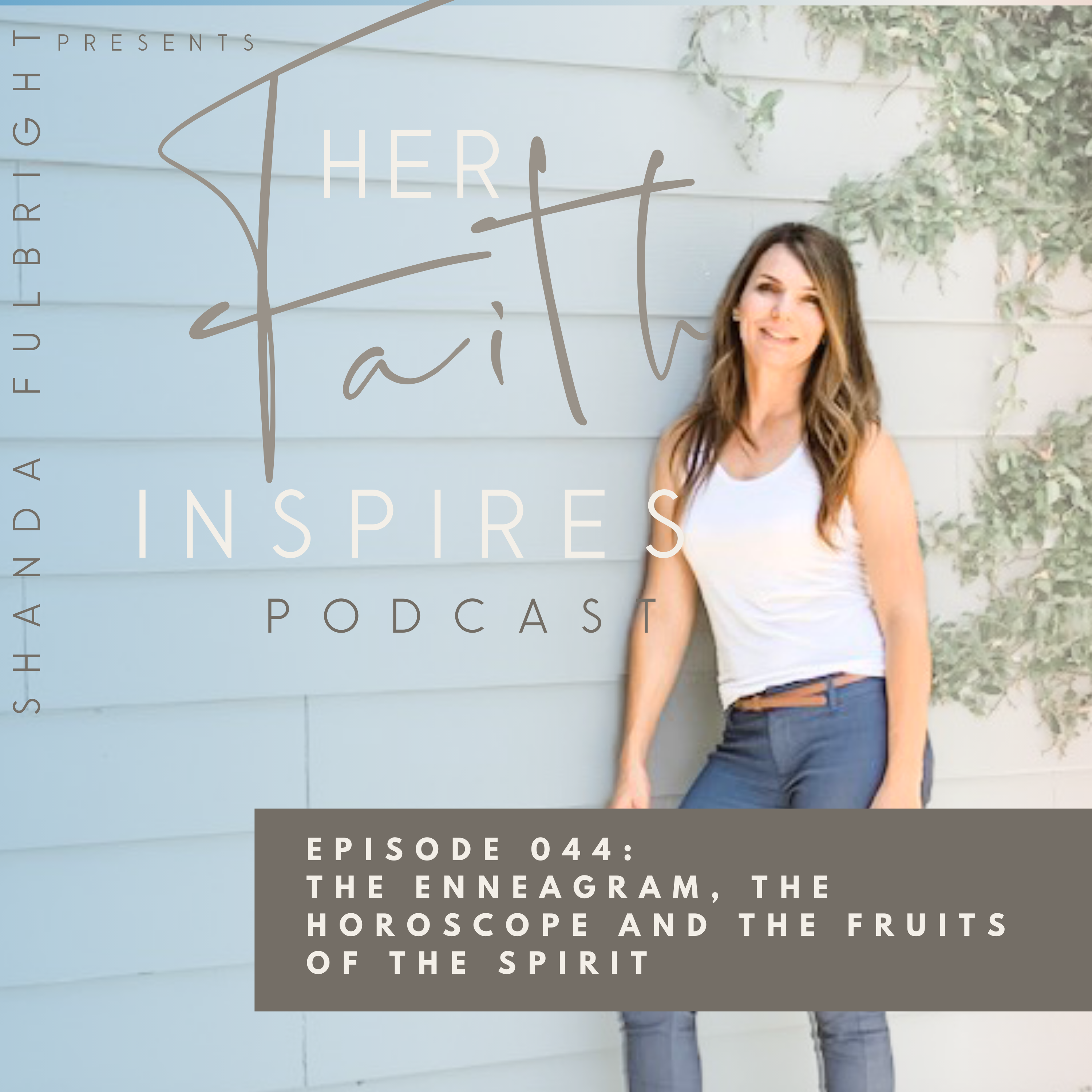Season: 4 Episode: 044
Summary:
The enneagram is the hottest personaltiy test in our culture today and it has hit the churches. Many Christians claim the enneagram gives insight into spiritual gifts and is a self-examination tool. They even quote scripture to back it up. But, is it? Shanda talks about the truth of the enneagram test and its origin. She also talks about why she thinks it’s comparable to the horoscope and why Christians should be aiming for the fruits of the Spirit instead of a number on a test.
Quotables:
“The enneagram is another spin-off of the ‘me culture'”.
“Is culture invading the church or is the church invading culture?”
“We have become a society that may not say with our mouths that the word of God is not enough, but we say it with our actions.”
“Our souls do not need self-discovery but to be known by God.”
Recommended Resources:
Website: shandafulbright.com
Instagram and Facebook: @shandafulbright
Email: hello@shandafulbright.com
Join my Facebook group: https://www.facebook.com/groups/2584147064952378/?ref=group_browse
Free Resources: https://www.shandafulbright.com/lihks
YouTube: Shanda Fulbright
Register for the online course “Study the Bible Like a Scholar”
Store: Shandafulbright.com/shop
Why Are Christians Running to the Enneagram?
Today we’re diving into a topic that might ruffle some feathers—and that’s okay. It’s just as controversial as my episode on The Self-Love Lie (episode 36, if you haven’t listened to that yet).
We’re talking about the Enneagram and why it’s so popular among Christians—especially women. I first heard about it on social media (surprise, surprise), where everyone was talking about their “number.” At first, I had no idea what that meant. But, after seeing enough posts, it became clear—people were excited about a personality test that claimed to help them understand their traits, their spiritual gifts, and how they relate to others.
I recently posted about this on Instagram stories. Influencers like Jen Hatmaker and others are deep into the Enneagram—and I knew I had to speak on it. Some might say I’m taking sanctification too far. Others will see the red flags and be glad we’re having this conversation.
Let me be clear: I’m not saying the Enneagram is evil. I’m not saying you’re not a Christian if you’ve taken it. However, I am calling attention to something the church has embraced without really questioning—and it’s time we do just that.
Where Did the Enneagram Come From?
If your church has used the Enneagram or you’ve seen it endorsed by a Christian organization, know this: it didn’t originate in the church.
The Enneagram has no Christian roots. None. A quick search will show you that its foundation is entirely outside the Christian worldview.
Its early ideas were introduced by George Gurdjieff, a New Age philosopher who believed in “waking sleep” and achieving higher consciousness by uniting body, mind, and spirit. Later, two occultists—Oscar Ichazo and Claudio Naranjo—developed it further as a personality tool.
1970
In the 1970s, Naranjo’s students introduced it to the Catholic Church. While some within Catholicism use it, many still reject it. Now, evangelical churches and universities are embracing it, often promoting it as a tool for spiritual growth and self-reflection.
Even the Enneagram Institute admits it’s a mystical, spiritual tool. It’s not just about personality—it’s about self-transcendence and self-discovery.
Misusing Scripture to Justify the Enneagram
Some Christian colleges and organizations use Scripture to justify the Enneagram, often quoting 1 Corinthians 11:28 to support the idea of self-examination.
Let’s talk about context. That verse is about examining our hearts before taking communion—not about discovering personality types. Verse 31 says, “If we judged ourselves rightly, we would not be judged.” The judgment being referenced is from God—not an Enneagram number.
Let’s be honest: the Enneagram is being misapplied. We’re using the Bible to justify a personality tool that was never rooted in God’s Word.
Again, I’m not saying all personality tests are sinful. Howeve when we elevate them to the point where we’re shaping our behavior based on test results instead of Scripture, we have a problem.
The Enneagram vs. The Horoscope
Now, why do I compare the Enneagram to the horoscope?
Let’s break it down. The Enneagram offers nine personality types: perfectionist, helper, performer, romantic, investigator, loyalist, enthusiast, challenger, and peacemaker.
According to Christianity.com, your dominant Enneagram type supposedly defines your personality—even though you might have traits from all nine.
Sound familiar? That’s exactly how horoscopes work. They claim to reveal your personality based on when you were born—traits you have no control over.
Here’s how Horoscope.com describes it:
“The chart energies of the planets and signs serve as the potential for personal expression within that individual.”
In other words, your uniqueness is based on cosmic forces. The Enneagram does something similar: it claims to reveal your potential, guide your relationships, and even direct your spiritual growth—all apart from Scripture.
Is the Church Being Influenced by Culture?
We’ve got to ask ourselves a hard question: is culture shaping the church, or are we influencing culture?
There is no biblical foundation for the Enneagram’s nine types. Show me where “helper” or “romantic” aligns with the fruit of the Spirit. You won’t find it.
We’re not called to discover who we are through man-made tools. We are called to be conformed to the image of Christ through the Word of God.
Jeremiah 17:9 tells us, “The heart is deceitful above all things, and desperately wicked: who can know it?”
Do we honestly believe a test created by flawed humans will reveal what only God can?
The Rise of Self-Helpism
We live in a culture obsessed with the self. Self-love, self-care, self-discovery. And the Enneagram fits neatly into that narrative.
This isn’t biblical sanctification—it’s self-helpism. It’s the idea that we can find both the cause and the cure for our brokenness by looking inward. But we are not the remedy. Only Jesus is.
According to Mama Bear Apologetics, the self-improvement market was worth $9.9 billion in 2016 and is expected to reach $13.2 billion. People are searching for answers, but they’re looking in the wrong place.
Self-helpism never leads us to the cross. It never calls for repentance. It doesn’t say, “Take up your cross daily.” It says, “Discover yourself.” But we don’t truly live until we die to self.
What Should Self-Reflection Look Like?
Self-reflection isn’t wrong—but it must be done before God. Only He can reveal what’s in our hearts and transform us into Christlikeness.
Our goal isn’t to discover a number. It’s to bear the fruit of the Spirit: love, joy, peace, patience, kindness, goodness, faithfulness, gentleness, and self-control (Galatians 5:22–24).
Final Thoughts
If you’ve taken the Enneagram or are exploring self-discovery, don’t feel condemned. My heart is not to shame you—it’s to get you to think critically.
Before we bring tools like the Enneagram into our churches, we need to ask: Where did it come from? Does it align with Scripture? Again, are we trusting the test more than we’re trusting the Lord?
Psalm 139 reminds us that we are fully known by our Creator—the One who knit us together in our mother’s womb. What our souls truly long for isn’t self-discovery. It’s to be known by God.
Let’s be ambassadors for His Word. Let’s turn to Scripture for wisdom, transformation, and intimacy with the Lord.
Close
That’s it for today’s episode. If you don’t follow me on social media, you can find me @shandafulbright. And if this episode encouraged or challenged you, please leave a star rating and review on iTunes—it helps the podcast reach more people.
Thanks for joining me today. I’ll catch you on the next one!





Leave a Reply